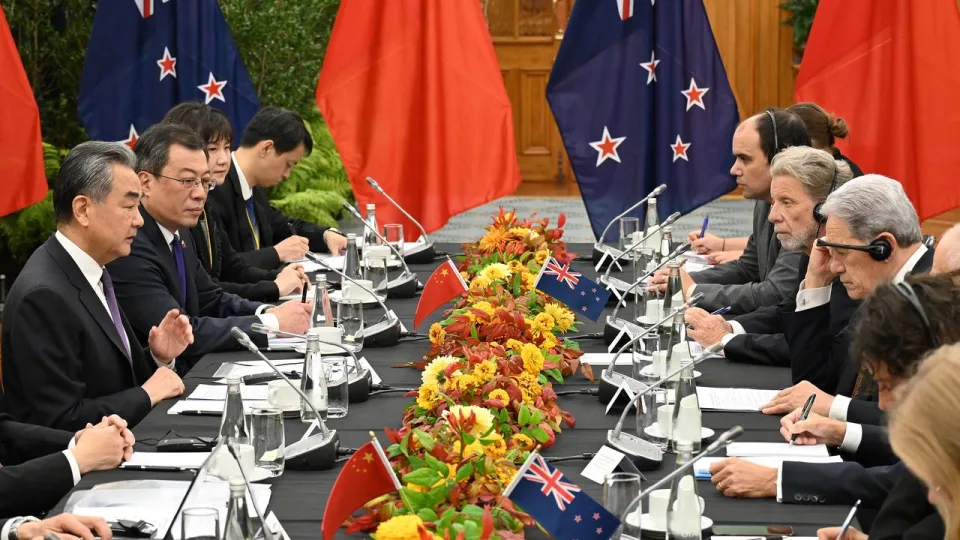New Zealand Deputy Prime Minister Winston Peters has reminded China of the regional primacy of the Pacific Islands Forum as Foreign Minister Wang Yi begins his trans-Tasman diplomatic tour.
Wang, the most senior Chinese politician to visit New Zealand since his last trip in 2017, visited Wellington on Monday ahead of travel to Australia.
“We are honoured to host you here in the Grand Hall at the New Zealand parliament, the heart of New Zealand’s democracy,” Peters said in comments to begin their formal meeting.
Peters, also New Zealand’s foreign minister, described the meeting as a “pleasure” in a media statement following official talks.
The pair enjoyed dinner at the Beehive executive building’s official restaurant where Peters showed off local beers by Wellington brewer Garage Project.
Peters said the talks were “wide-ranging and enabled engagement on many facets of New Zealand’s relationship with China, including trade, business, and people-to-people links”.
That statement also pointed to thorny discussions of China’s efforts to engage in the Pacific.
Under Wang’s leadership, China has sought security deals with Pacific nations, some successfully, such as the Solomon Islands, and others less so, in Polynesia.
China is seeking to engage more deeply in the region as it seeks geopolitical advantages over the United States, and aligned nations such as Australia and New Zealand.
Peters indirectly referenced China’s attempts at bilateral engagement in the blue continent, where Australia, New Zealand and other Pacific nations agree diplomacy is best conducted through the Pacific Islands Forum.
“New Zealand follows developments in the Pacific closely and emphasises the importance of engaging through existing regional institutions and arrangements, in particular on regional security matters,” Peters said.
Australia and New Zealand, the Pacific Islands Forum’s regional powers, have invested heavily in the success of the 18-nation bloc, which uses a consensus-style decision-making process that often does not suit Beijing.
As is standard practice for Kiwi engagements with Chinese leaders, Peters spelled out several of New Zealand’s long-standing disputes with China.
“It was important to acknowledge areas of difference such as human rights, including the situation in Xinjiang, Hong Kong and Tibet … and raised concerns over increased tensions in the South China Sea and Taiwan Strait,” the 78-year-old said.
Prime Minister Chris Luxon and Trade Minister Todd McClay also enjoyed brief meetings with Wang.
“The international and regional situation is changing and turbulent, and the relationship between China and New Zealand is a force for stability in this world,” Wang told Luxon, according to newspaper The Post.
It is not clear whether either party raised the AUKUS defence pact, of which New Zealand is interested in joining as a tier-two member.
While Russia’s illegal war with Ukraine was discussed, it is also unknown whether any of the New Zealand government representatives argued against China providing indirect support for Moscow.
“We emphasised the constructive role China can play in responding to regional and international security challenges such as the Russia-Ukraine and Israel-Hamas conflicts and de-escalating tensions on the Korean Peninsula,” Peters said.
NZ and Australia are formal allies but the two countries have distinct relationships with Beijing.
Australia has had a more adversarial relationship, particularly under the government of Scott Morrison, who labelled China as a bully engaged in “economic coercion”.
In 2020, China levied trade tariffs which cost Australian business an estimated AUD$20 billion (US$13 million), which have since been eased to about one-tenth of that value.
New Zealand has enjoyed the benefits of strong economic ties in recent years, as the first developed country to sign a bilateral free trade deal with Beijing in 2008.














